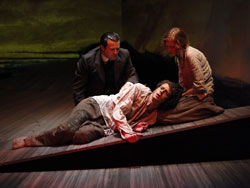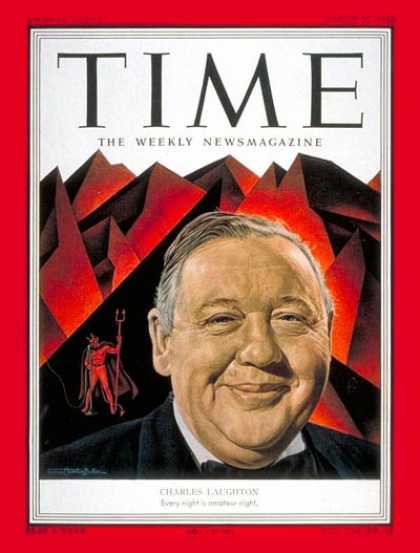“Except for The Night of the Hunter, Mr. Laughton’s post-Galileo career is no longer widely remembered save by scholars. But enough of it survives on sound recordings and kinescopes to prove that F. Scott Fitzgerald was all wet when he claimed that ‘there are no second acts in American lives.’ Charles Laughton, who moved from England to America to seek fame and fortune and came perilously close to losing his soul along the way, had a second act that redeemed all that came before it…”
Archives for March 2, 2012
TT: How ya gonna keep ’em down on the farm?
In today’s Wall Street Journal I review the Irish Repertory Theatre’s revival of Beyond the Horizon. Here’s an excerpt.
* * *
Eugene O’Neill was the Theodore Dreiser of American theater–and there are plenty of people who won’t take that as a compliment. Like the author of “Sister Carrie,” he wrote of the sorrows of desperate men with a rough-hewn ineloquence that is not to all tastes. Though his gifts were that of the naturalist, he wrongly took himself to be a poet, and his attempts to use the techniques of Greek tragedy to comment on the American scene give much of his work an overwrought quality that many contemporary viewers find offputting. But when O’Neill got things right, he got them very right indeed, enough so that his best plays, for all their myriad defects of craft, remain compelling.
 This is a good season to test the truth of that claim, since four of O’Neill’s most important but least frequently produced plays are being presented by a quartet of the country’s leading drama companies over the next few months. In Chicago, the Goodman Theatre is doing “The Iceman Cometh.” In Washington, D.C., Arena Stage is putting on “Ah, Wilderness!” and the Shakespeare Theatre Company is mounting the near-forgotten “Strange Interlude.” Here in New York, the Irish Repertory Theater, which has served O’Neill admirably throughout its 24-season history, has just opened a rare revival of “Beyond the Horizon,” the 1918 tragedy that won him the first of his four Pulitzer Prizes.
This is a good season to test the truth of that claim, since four of O’Neill’s most important but least frequently produced plays are being presented by a quartet of the country’s leading drama companies over the next few months. In Chicago, the Goodman Theatre is doing “The Iceman Cometh.” In Washington, D.C., Arena Stage is putting on “Ah, Wilderness!” and the Shakespeare Theatre Company is mounting the near-forgotten “Strange Interlude.” Here in New York, the Irish Repertory Theater, which has served O’Neill admirably throughout its 24-season history, has just opened a rare revival of “Beyond the Horizon,” the 1918 tragedy that won him the first of his four Pulitzer Prizes.
I won’t try to tell you that O’Neill’s first full-length play is a masterpiece. In the proper hands, though, “Beyond the Horizon” can still be powerfully moving, and this production, well staged by Ciarán O’Reilly (who previously directed the Irish Rep’s unforgettable 2009 revival of O’Neill’s “The Emperor Jones”) and performed with sympathy and restraint by an excellent cast, makes an unexpectedly strong case for a play that hasn’t been seen in New York for close to a decade….
I’ve learned in recent years that many O’Neill plays that come across as overblown when performed on a proscenium stage also gain in tautness and concentration by being staged in an intimate performance space like the Irish Rep’s 140-seat Off-Broadway theater. That’s exactly what happens here. No one in Mr. O’Reilly’s cast is tempted to exaggerate by the necessity of playing to a crowd, and all nine actors steer clear of the parallel temptation to lapse into stage-Irish charm. The tone they strike is modern, and it works….
* * *
Read the whole thing here.
TT: Charles Laughton, genius
In today’s Wall Street Journal “Sightings” column I write about the second career of Charles Laughton, during which he directed for the stage (The Caine Mutiny Court-Martial) and screen (The Night of the Hunter) and appeared in a one-man show whose unexpected success put him on the cover of Time.
Here’s an excerpt.
* * *
 In 1947 Charles Laughton’s career, if not quite on the skids, was definitely in the doldrums. Long acclaimed as Hollywood’s foremost character actor, he had made only one film of any artistic consequence, Jean Renoir’s “This Land Is Mine,” in the past seven years. The rest of the time he coasted, frequently indulging in self-parody–and nobody was easier to spoof than the man who played Captain Bligh in “Mutiny on the Bounty” and Quasimodo in “The Hunchback of Notre Dame.” He wouldn’t have been the first actor to sell his soul for a swimming pool (or, in his case, an art collection). But with Laughton the waste would have been unforgivable, since he was, in Laurence Olivier’s words, “the only actor I ever knew who was a genius.”
In 1947 Charles Laughton’s career, if not quite on the skids, was definitely in the doldrums. Long acclaimed as Hollywood’s foremost character actor, he had made only one film of any artistic consequence, Jean Renoir’s “This Land Is Mine,” in the past seven years. The rest of the time he coasted, frequently indulging in self-parody–and nobody was easier to spoof than the man who played Captain Bligh in “Mutiny on the Bounty” and Quasimodo in “The Hunchback of Notre Dame.” He wouldn’t have been the first actor to sell his soul for a swimming pool (or, in his case, an art collection). But with Laughton the waste would have been unforgivable, since he was, in Laurence Olivier’s words, “the only actor I ever knew who was a genius.”
Instead, Laughton fooled everyone by returning to the stage for the first time since 1936. Nor did he choose a safe star vehicle for his return: He played the title role in the U.S. premiere of Bertolt Brecht’s “Galileo,” and he translated the play himself.
If you’ve seen Classic Stage Company’s current Off-Broadway revival of “Galileo,” you know that Laughton’s translation is nothing short of brilliant. But you may not be aware that it marked a turning point in his career. Yes, he kept on making second-rate movies and just-kidding TV guest shots to keep the cash flowing–but at the same time, he reinvented himself as an artist. His second life has been chronicled by Simon Callow, himself an outstanding actor and biographer, whose “Charles Laughton: A Difficult Actor,” published in 1987, is one of the finest theatrical biographies ever written. Every page is a joy to read, but to my mind the best thing about the book is the way in which Mr. Callow tells how Laughton turned his career around.
After “Galileo,” Laughton put together an informal school of young Hollywood actors (including Robert Ryan and Shelley Winters) whom he introduced to the transforming discipline of classical acting. Then he met Paul Gregory, an agent-producer who had the ingenious notion of sending him out on the road with a one-man show in which he read his favorite poems and prose works aloud with colossal relish. The show, which took in everything from Shakespeare to Jack Kerouac, was a huge success…
* * *
Read the whole thing here.
The original theatrical trailer for The Night of the Hunter:
TT: Almanac
“There’s no such thing as old age; there is only sorrow.”
Edith Wharton, A Backward Glance
